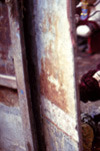What do you think?
Rate this book


80 pages, Paperback
First published January 28, 2004
"Father, neighbours, the babu's wife, everyone offers the same explanation to Giri. Fate rules over everyone. What can you do? It would have been good were you fated to keep her with you. She's a girl, not a boy. A girl's by fate discarded, lost if she's dead, lost if she's wed."